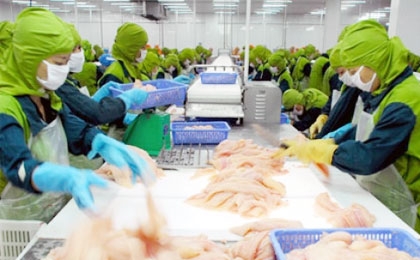Delta seafood firms, farmers in chain of debts

The chain can collapse at any time, burdening farmers’ with pressure to clear bank loans, while sending the businesses to bankruptcy.
In Can Tho city’s Thot Not District, for instance, a large number of catfish farms have been left deserted, while local farmers, who used to be billionaires from selling the fish, are now seeking buyers for their land plots.
In one typical example of the chain of debt, local farmer Ho Van Nghia said that in July 2011 he sold 260 tonnes of catfish at VND23,500 a kilogramme to An Giang-based Vinafish Export Import Corporation. The contract was worth a total of VND6.3 billion, and was expected to be settled within 30 days.
However, the processor delayed fully repaying Nghia, and ended up owing him VND4.7 billion at the end of last year.
Even though he took the company to court, Nghia still has not gotten back his money.
“I myself owe bank loans and feed suppliers more than VND3 billion, and selling my house and land is the only way to have enough money for settling the debt,” said Nghia.
“Dozens of other farmers are in the same situation.”
Plants shut down, workers lose jobs
For its part, Vinafish Co has laid off most of its workers due to the lack of input materials, according to some laborers who are still working for the heavily indebted company.
An employee of the company also admitted to Tuoi Tre that Vinafish’s workforce has been slashed from 600 to only 100 labourers.
When the company is able to buy fish for raw material, usually 30 tons at most, it simply hires some day laborers for processing, he said.
“But many other processors are doing the same thing, since this is a common problem in the seafood processing and exporting sector,” he protested.
Many of the 21 seafood processing plants in An Giang Province have reduced the number of workers, or have even shut down.
Even workers who have yet to be fired have considered returning to their hometown, as they cannot make ends meet with the modest wages due to the material shortage.
Nguyen Thi Thanh, a seafood worker, said she used to work for An Khang Co, and had move to several other firms after the company went insolvent.
But the other companies have also worked perfunctorily.
“Due to the material shortage, the plant has repeatedly closed,” said Thanh.
Domino collapse
Seafood experts said what is most dangerous to the seafood sector is the domino collapse of the debt chains, if banks continue to tighten credit to the processors.
Under the banks’ tightened credit policy, seafood companies cannot access bank loans, and thus have no capital to buy fish from farmers.
Farmers will then have no money to replay feed suppliers, or reinvest in their farming, experts warned.
Duong Ngoc Minh, deputy chairman of the Vietnam Association of Seafood Exporters and Processors (VASEP), said seafood companies used to need only the fish buying contract to be eligible for bank loans.
“But they are no longer able to do so under the current credit policy,” said Minh.
“VASEP figures show that less than 10 percent of businesses have cleared their payments with farmers on time.”
80 pct of plants cut production
As many as 80 percent of the seafood processing plants have had to cut production, and some even had to shut down operations, confirmed Minh of VASEP.
In Can Tho, the total production of the 12 local plants has dropped from 1,200 tons a day to only 300 tons a day, he said.
The fish processing plants’ shutdown has also lead to the closure of many seafood feed processing plants, he added.
“More than 70 percent of the fish feed manufacturing plants are in trouble, 40 percent of which have had to stop operation,” elaborated Minh.
According to the Can Tho Seafood Association, fish farmers have given up their farming en masse, resulting in the raw material shortage, while seafood processors have faced capital shortages to buy materials.
Earlier, since many processors have prolonged catfish payments to farmers, or even defaulted on the debts, many farmers have also demanded the latter pay them in cash in advance to be able to receive the fish.
This has also exacerbated the short supply of materials, the association said.
What the stars mean:
★ Poor ★ ★ Promising ★★★ Good ★★★★ Very good ★★★★★ Exceptional
Related Contents
Latest News
More News
- VIFC launches aviation finance hub to tap regional market growth (February 06, 2026 | 13:27)
- KKR and Singtel step up data centre investment in Southeast Asia (February 06, 2026 | 13:09)
- MAE names big 10 policy wins in 2025 (February 06, 2026 | 08:00)
- US firms deepen energy engagement with Vietnam (February 05, 2026 | 17:23)
- Vietnam records solid FDI performance in January (February 05, 2026 | 17:11)
- Site clearance work launched for Dung Quat refinery upgrade (February 04, 2026 | 18:06)
- Masan High-Tech Materials reports profit: a view from Nui Phao mine (February 04, 2026 | 16:13)
- Hermes joins Long Thanh cargo terminal development (February 04, 2026 | 15:59)
- SCG enhances production and distribution in Vietnam (February 04, 2026 | 08:00)
- UNIVACCO strengthens Asia expansion with Vietnam facility (February 03, 2026 | 08:00)

 Tag:
Tag:


















 Mobile Version
Mobile Version